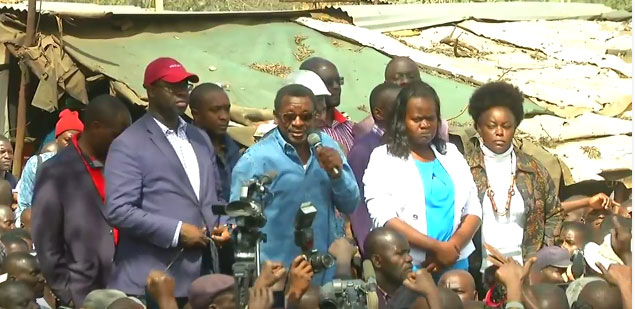
Nairobi, Kenya | AFP | Churches preached peace on Sunday in Mathare, a Nairobi slum that has been hit by days of violent demonstrations since last week’s disputed presidential vote, but it was opposition leader Raila Odinga the people were desperate to hear from.
Odinga had been silent since the Friday night declaration that his opponent, incumbent President Uhuru Kenyatta, had won the election, but he re-emerged Sunday afternoon to reiterate his claims of vote fraud and to announce that his next moves would be unveiled on Tuesday.
“I want to tell you not to go to work tomorrow (Monday). We are not done yet. We will not give up,” Odinga told thousands of fist-pumping supporters who gathered in a dirt clearing in Nairobi’s Kibera slum.
The speech was exactly what his supporters wanted to hear as they waited for a sign from their flagbearer after scenes of looting and clashes in opposition strongholds like Kibera and Mathare and in parts of western Kenya.
– ‘Ready for whatever will come’ –
“It was quiet and we were worried, because we did not know the plan. Now, we’re very ready for whatever will come,” said Duncan Nyamo, an Odinga supporter who was among the crowd in the slum.
“We are ready to die.”
In both Kibera and Mathare, roads still displayed burn marks from tyres set ablaze by protesters over previous days, but on Sunday many people were going about their business and some shopkeepers were timidly reopening.
“It has been very violent over the past few days, but it’s a lot calmer today,” said Susan Atieno, 19, as she sold doughnuts on a garbage-strewn roadside in Mathare.
AFP’s tally of deaths between Friday evening and Saturday night stands at 16, including nine killed in Nairobi’s slums.
– Deep frustration –
Slum residents flocked to church on Sunday where pastors urged peace, while understanding the concerns of their congregation.
“What you have to understand is the amount of frustration here,” Reverend Julius Tai said outside his tiny corrugated iron church with 30 plastic chairs for worshippers.
Kenyatta, a wealthy member of the Kikuyu elite, was elected Friday with more than 54 percent of the vote, beating Odinga, a Luo.
It is the fourth time Odinga has lost a presidential election, running on a platform of more equitable economic growth, an argument that goes down well in the slums.
But ethnic grievance is also a key aspect of his appeal.
“Since independence, only two tribes have ruled the country, but the others also want their share of the cake,” the pastor said.
Three of Kenya’s four presidents have been Kikuyu and the other Kalenjin, leaving Luos feeling excluded from power for over half a century.
I applaud the people of Kenya for their commitment to democracy during the recent elections. Read my full statement: https://t.co/KoaNFG7lId
— Kofi Annan (@KofiAnnan) August 12, 2017
– ‘Violence is useless’ –
Ten years after the worst electoral violence in Kenya’s history left 1,100 dead, the pastor called for peace.
“I firmly believe in the rule of law, and we should use the justice if we want to protest against the election result,” Tai said.
“Violence is useless. After all, we are all Kenyan brothers, and you don’t kill your brother.”
Nearby, Reverend John Gitonga gave a sermon at his church. “It is important to respect peace, we are not different from our neighbours,” he said.
Religious beliefs are strongly held in Kenya and among the protesters, said Patrick, a 25-year-old Odinga supporter who had taken to the streets in recent days.
“Today, it’s the day of the Lord, so the slum is quiet. But we are waiting for Raila’s instructions, and we’ll do exactly what he says.”
Susan, the doughnut vendor, was more circumspect. “I will listen to Raila to know the way forward, but violence is not good for business, I have to pay the rent, and to eat,” she said.
And if he calls for violence? “I will listen to God first,” she replied.
 The Independent Uganda: You get the Truth we Pay the Price
The Independent Uganda: You get the Truth we Pay the Price



